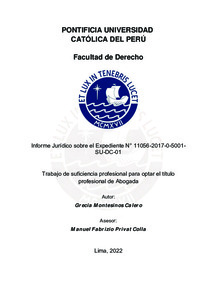| dc.contributor.advisor | Privat Colla, Manuel Fabrizio | |
| dc.contributor.author | Montesinos Calero, Grecia | |
| dc.date.accessioned | 2022-08-13T01:20:47Z | |
| dc.date.available | 2022-08-13T01:20:47Z | |
| dc.date.created | 2022 | |
| dc.date.issued | 2022-08-12 | |
| dc.identifier.uri | http://hdl.handle.net/20.500.12404/23066 | |
| dc.description.abstract | Aunque la trabajadora en estado de gestación se encuentra reconocida como un sujeto especial de
protección tanto en los instrumentos internacionales como en nuestro ordenamiento jurídico, resulta
necesario estar en una constante revisión tanto del alcance del referido principio protector, así como
de los mecanismos de tutela regulados a su favor. En esa línea, también reviste de importancia
comprobar si, al momento de atender las controversias en sede judicial, nuestros órganos
jurisdiccionales actúan observando el citado principio protector. Toda esta revisión siempre
atendiendo en que nos situamos en un Estado Constitucional de Derecho.
El Expediente Laboral N° 11056-2017-0-5001-SU-DC-01, referido a la no renovación del contrato
laboral sujeto a modalidad y a un encubierto despido nulo por embarazo de una trabajadora, nos
ofrece precisamente la oportunidad de evaluar lo señalado líneas arriba. Así, el presente Informe
Jurídico pretende analizar los hechos y argumentos expuestos en el citado expediente, con la
finalidad de determinar si la decisión motivada por la Corte Suprema cumple con la observancia del
principio protector de la madre trabajadora.
De la revisión de la sentencia expedida, se advierte que la normativa vigente destinada a proteger
a la madre trabajadora en estado de gestación no cumple con tener una eficacia protectora; por el
contrario, los requisitos exigidos para que opere los mecanismos de tutela diluyen toda actuación
proteccionista. En esa línea, verificamos que la Corte Suprema reduce su análisis al cumplimiento
de formalidades, contraviniendo los principios contemplados en el Estado Constitucional de
Derecho. | es_ES |
| dc.description.abstract | Although the pregnant employee is recognized as a special subject of protection both in international
instruments and in our legal system, it is necessary to constantly review the scope of the
aforementioned protective principle, as well as the protection mechanisms regulated in her favor.
Along these lines, it is also important to verify whether, when dealing with disputes in the courts, our
jurisdictional bodies act in compliance with the aforementioned protective principle. All this review
always taking into account that we are in a Constitutional State of Law.
Labor File No. 11056-2017-0-5001-SU-DC-01, referring to the non-renewal of the labor contract
subject to modality and a concealed null dismissal due to pregnancy of a female employee, offers
us precisely the opportunity to evaluate the above mentioned. Thus, this Legal Report intends to
analyze the facts and arguments presented in the aforementioned case, with the purpose of
determining whether the decision motivated by the Supreme Court complies with the observance of
the principle of protection of the working mother.
From the review of the ruling issued, it is evident that the current regulations intended to protect the
working mother in a state of pregnancy do not comply with the protective effectiveness; on the
contrary, the requirements demanded for the tutelage mechanisms to operate dilute any protectionist
action. In this line, we verify that the Supreme Court reduces its analysis to the fulfillment of
formalities, contravening the principles contemplated in the Constitutional Rule of Law. | es_ES |
| dc.language.iso | spa | es_ES |
| dc.publisher | Pontificia Universidad Católica del Perú | es_ES |
| dc.rights | info:eu-repo/semantics/closedAccess | es_ES |
| dc.subject | Mujeres embarazadas--Legislación--Perú | es_ES |
| dc.subject | Despido de empleados--Legislación--Perú | es_ES |
| dc.subject | Mujeres trabajadoras--Derechos | es_ES |
| dc.title | Informe Jurídico sobre el Expediente N° 11056-2017-0-5001- SU-DC-01 | es_ES |
| dc.type | info:eu-repo/semantics/bachelorThesis | es_ES |
| thesis.degree.name | Abogado | es_ES |
| thesis.degree.level | Título Profesional | es_ES |
| thesis.degree.grantor | Pontificia Universidad Católica del Perú. Facultad de Derecho. | es_ES |
| thesis.degree.discipline | Derecho | es_ES |
| renati.advisor.dni | 43409480 | |
| renati.advisor.orcid | https://orcid.org/0000-0002-1619-1679 | es_ES |
| renati.author.dni | 76547679 | |
| renati.discipline | 215106 | es_ES |
| renati.juror | Mendoza Legoas, Luis Erwin | es_ES |
| renati.juror | Merzthal Shigyo, Marilú del Pilar | es_ES |
| renati.level | https://purl.org/pe-repo/renati/level#tituloProfesional | es_ES |
| renati.type | https://purl.org/pe-repo/renati/type#trabajoDeSuficienciaProfesional | es_ES |
| dc.publisher.country | PE | es_ES |
| dc.subject.ocde | https://purl.org/pe-repo/ocde/ford#5.05.01 | es_ES |





